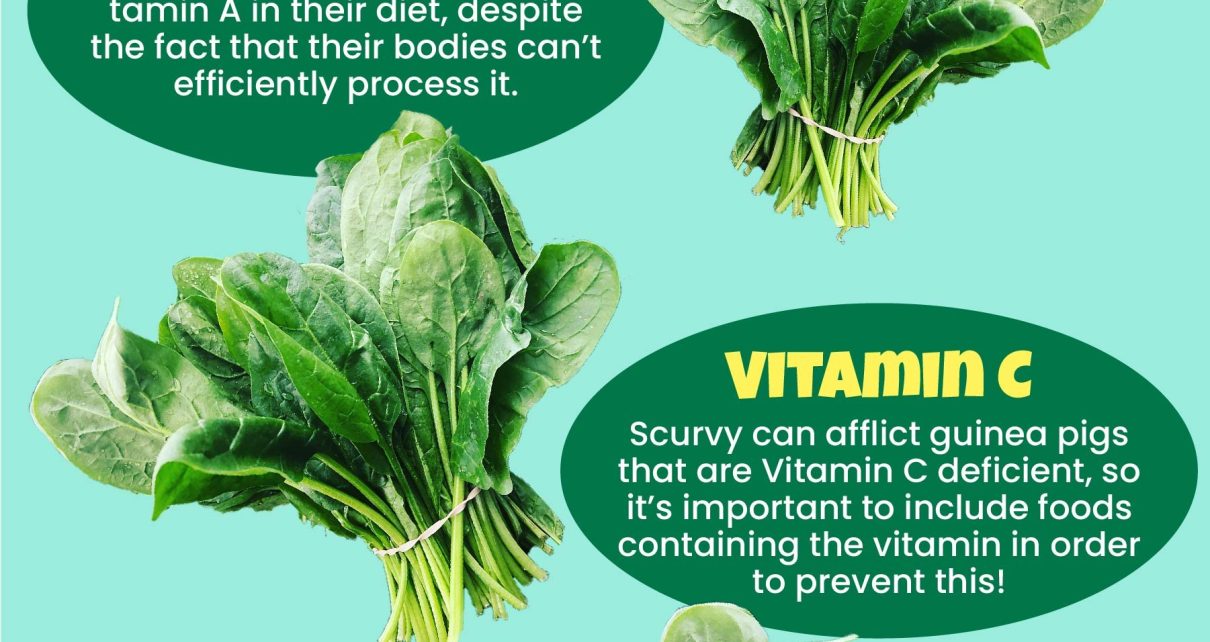Can guinea pigs eat spinach? Yes, they can enjoy spinach, but moderation is key. This leafy green is packed with nutrients that can benefit your furry friend, yet it also contains oxalates that can cause problems if consumed in large amounts.
When introducing spinach to your guinea pig’s diet, start slowly to observe how they react. Always wash the leaves thoroughly to remove any pesticides or dirt. Balancing spinach with a variety of other vegetables ensures your pet receives all the essential nutrients they need.
Can Guinea Pigs Eat Spinach?
When it comes to feeding our furry friends, it’s crucial to know which vegetables are safe and healthy. One common question among guinea pig owners is, “Can guinea pigs eat spinach?” Spinach is packed with nutrients, but it also has certain properties that you need to consider. Let’s dive into the details to help you understand how spinach fits into your guinea pig’s diet.
Understanding Guinea Pig Diets
Before we focus specifically on spinach, it’s helpful to know what guinea pigs need in their diet. Guinea pigs are herbivores, which means they primarily eat plants. Their diet should consist of:
- High-quality hay (like timothy hay)
- Fresh vegetables
- Fruits (in moderation)
- Specially formulated pellets for guinea pigs
Hay is the cornerstone of their diet and should be available at all times. It provides essential fiber that aids their digestion. Fresh vegetables add variety and vital nutrients, while fruits should only be given as occasional treats.
What Nutrients Does Spinach Provide?
Spinach is a leafy green vegetable that is rich in several nutrients, including:
- Vitamin C: Guinea pigs cannot produce vitamin C on their own. Therefore, they need to get this vital nutrient from their diet. Spinach contains some vitamin C, which supports their immune system.
- Vitamin A: This vitamin is important for skin health, vision, and overall growth.
- Iron: Spinach provides iron, which helps in the formation of red blood cells.
- Calcium: Spinach is high in calcium, which is important for bone health but can be a concern if consumed in excess.
- Fiber: Spinach contains fiber that helps with digestion.
While these nutrients are beneficial, the key is moderation.
How Much Spinach Can Guinea Pigs Eat?
When introducing spinach into your guinea pig’s diet, it’s essential to do so gradually. Due to its high calcium content, spinach should only be offered in small amounts. Here are some guidelines to follow:
- **Introduce Slowly:** Start with a small piece, about the size of a quarter. Monitor your guinea pig’s reaction.
- **Limit Frequency:** Offer spinach once or twice a week rather than every day.
- **Mix with Other Veggies:** Combine spinach with other leafy greens like romaine lettuce or cilantro to balance their diet.
Potential Health Issues from Spinach
While spinach has many benefits, there are potential downsides if fed in excess:
Calcium Content
As mentioned earlier, spinach contains a high level of calcium. Too much calcium can lead to:
- Bladder stones
- Kidney problems
- *Urinary tract issues*
Guinea pigs are prone to urinary issues, so it is crucial to maintain a balanced diet to avoid overloading them with calcium.
Oxalates in Spinach
Spinach also contains oxalates, which can bind with calcium and form crystals. This can exacerbate the risk of stone formation. Here’s what you need to know:
- Oxalates can hinder calcium absorption.
- They may interfere with kidney function in susceptible guinea pigs.
For this reason, it’s often advised to limit spinach intake and rotate it with other leafy greens that are lower in oxalates.
Safe Alternatives to Spinach
If you’re worried about the potential risks of feeding spinach to your guinea pig, several safe alternatives can still provide essential nutrients. Consider offering:
- Romaine lettuce
- Collard greens
- Kale (in moderation)
- Basil
- Parsley
These vegetables also contain good amounts of Vitamin C and have lower levels of calcium and oxalates, making them safer regular choices.
How to Prepare Spinach for Your Guinea Pig
When you decide to include spinach as a treat, it’s essential to prepare it correctly to maximize its benefits and minimize risks:
- **Wash Thoroughly:** Rinse the spinach leaves well to remove any pesticides or dirt.
- **Cut into Manageable Pieces:** Smaller pieces are easier for your guinea pig to eat and digest.
- **Avoid Salty Dressings or Additives:** Serve the spinach plain; guinea pigs don’t need extra seasoning.
Signs of Discomfort in Guinea Pigs After Eating Spinach
After introducing spinach, keep an eye on your guinea pig for any signs of digestive upset, such as:
- Diarrhea
- Constipation
- Vomiting (though rare in guinea pigs)
- Reduced appetite
If you notice any of these symptoms, stop feeding spinach and consult your veterinarian for further advice.
In conclusion, guinea pigs can eat spinach, but moderation is key. While spinach is rich in vitamins and minerals, its high calcium and oxalate content can pose certain risks if consumed excessively. It’s always best to provide a variety of vegetables to ensure a balanced diet. Always consult with your veterinarian if you have concerns about your guinea pig’s diet, and feel free to ask any questions about safe greens or other feeding practices for your beloved pet. Whether you decide to include spinach or turn to safer alternatives, your guinea pig will benefit from your careful consideration of their dietary needs.
Can Guinea Pigs Eat SPINACH? | Be Careful With Feeding This Leafy Vegetable to Guinea Pigs!
Frequently Asked Questions
What are the nutritional benefits of spinach for guinea pigs?
Spinach is rich in vitamins A, C, and K, along with several essential minerals. These nutrients contribute to maintaining a guinea pig’s overall health. Vitamin C is particularly important as guinea pigs cannot produce it on their own and require a constant dietary source. Spinach also provides dietary fiber, which aids digestion and helps prevent obesity when fed in moderation.
How often should spinach be fed to guinea pigs?
Guinea pigs can enjoy spinach as an occasional treat rather than a staple of their diet. Offering spinach once or twice a week is generally safe. Overfeeding spinach can lead to health issues due to its high oxalate content, which can interfere with calcium absorption and contribute to bladder stones.
Are there any risks associated with feeding spinach to guinea pigs?
Yes, while spinach offers nutritional benefits, it also contains oxalates, which can bind with calcium and lead to the formation of kidney stones if consumed in large amounts. It’s important to balance spinach with other leafy greens that are lower in oxalates, such as romaine lettuce, to minimize these risks.
What other vegetables can guinea pigs eat alongside spinach?
Guinea pigs enjoy a variety of vegetables that complement their diet alongside spinach. Safe options include bell peppers, cucumbers, carrots, and leafy greens like kale and romaine lettuce. Providing a diverse range of vegetables ensures they receive a broad spectrum of nutrients and keeps mealtime interesting.
Can baby guinea pigs eat spinach?
It’s best to introduce spinach to baby guinea pigs once they reach about 3 months of age. Their digestive systems are still developing, and it’s crucial to provide them with a more stable diet that focuses on hay and specially formulated pellets. After they are older, you can offer spinach in moderation.
How should spinach be prepared for guinea pigs?
When preparing spinach for guinea pigs, wash the leaves thoroughly to remove any pesticides or dirt. Serve fresh, raw spinach leaves as cooked spinach loses many nutrients. Cut the leaves into manageable pieces to make it easy for them to eat, and ensure that they have fresh water available at all times.
Final Thoughts
Spinach can be a nutritious treat for guinea pigs, but moderation is crucial. High oxalate levels in spinach can lead to kidney stones if consumed in excess. Always introduce new foods gradually and monitor your pet’s health.
So, can guinea pigs eat spinach? Yes, but limit it to small amounts to ensure their well-being. Providing a balanced diet rich in hay and vegetables will keep your guinea pig healthy and happy.





